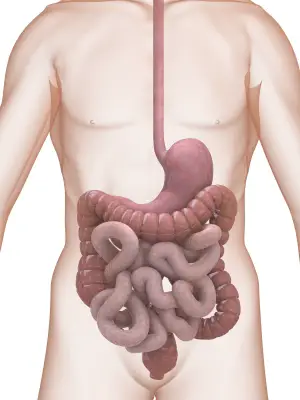The Link Between Irritable Bowel Syndrome & Gluten Sensitivity

There are many conditions that can cause diarrhea, bloating and abdominal pain that are more common than celiac disease. One of these, called irritable bowel syndrome, may affect as many as 10% to 20% of teenagers and adults. When it is associated with diarrhea, it can be called d-IBS. This may be different in some ways from irritable bowel syndrome with constipation. People with one form may develop the other.
People with celiac disease, especially adults with less severe symptoms, may be diagnosed as having d-IBS at some point. It is important to make sure treating physicians are aware of the possibility of celiac disease. If you have symptoms and/or you have other reasons for thinking you have CD, such as a family history or other autoimmune disease, you should ask your doctor to test you with screening blood tests.
There are many different levels of IBS severity, as well as problems related to the diagnosis of this condition. Many doctors consider it a diagnosis of exclusion. This means that after a patient has been screened for infectious diarrhea, inflammatory bowel disease, celiac disease and other possible causes, irritable bowel syndrome is what is left.
In fact, there may be less of a clear difference between d-IBS and CD than initially believed. A number of studies have shown that people with irritable bowel syndrome may have an improvement in symptoms when they go on a gluten-free diet.
For example, in a study published in 2007, investigators put a group of people with IBS on a gluten-free diet. This group did not have celiac disease, meaning their intestinal biopsies were normal. 37% of patients with d-IBS had celiac disease-associated IgG antibodies and 39% had HLA-DQ2. 18% of patients with IBS and not diarrhea had celiac disease-associated antibodies and 23% had HLA –DQ2.
After 6 months on a gluten-free diet, many of the patients had improvement in symptoms. 60% of the d-IBS patients with HLA-DQ2 and IgG antibodies had improvements. However, 12% of patients who did not have IgG antibodies or HLA-DQ2 improved. This means that 12% of the patients with d-IBS and no evidence of celiac disease did improve on a gluten-free diet.
More recent studies have indicated that the overlap between these two diagnoses may be less clear than believed, although the mechanisms are not understood. In a study published in 2011, 39 patients without celiac disease but with irritable bowel syndrome were tested. CD was eliminated either by biopsy while the patients were eating gluten, or because they were HLA-DQ2 or HLA-DQ8 negative. The patients were randomized into two groups, either to a gluten rich or gluten-free diet.
After 3 weeks, the patients eating gluten had more pain, bloating, tiredness, and dissatisfaction with stool consistency. There was no significant change on any of the laboratory tests, and nothing to indicate how the gluten caused symptoms in patients without celiac disease. The authors of the study stated, “…that gluten is indeed a trigger of gut symptoms and tiredness” in patients without celiac disease. This may be called “non-celiac gluten intolerance” or “wheat intolerance.”
It seems possible that gluten does cause both gastrointestinal symptoms and also fatigue in people who do not have celiac disease. The mechanisms are not yet known and more study needs be done. Because this is possible, anyone with irritable bowel syndrome wanting to try a gluten-free diet should not be discouraged.
[hr]






